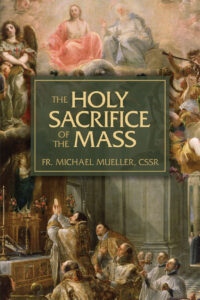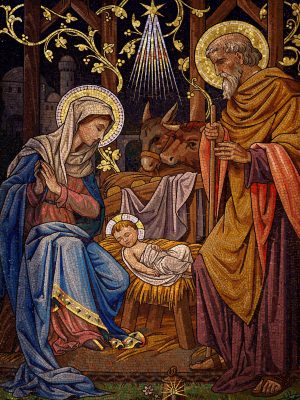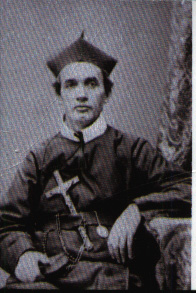PREVIOUS to the birth of Our Lord, the Roman emperor had published an edict commanding all Roman subjects to go and be enrolled in their native country. So Joseph departed with his spouse, Mary, to have their names enrolled in Bethlehem. As soon as they arrived there, the time for Mary’s delivery was at hand, and Joseph went about the town looking for a lodging. But being poor, they were driven away by everyone, even from the inn where the other poor had been received. So they went away from the town in the night, and having found a cave, Mary entered. But Joseph said to her: “My spouse, how can you pass the night in this damp cold place? Do you not see that this is a stable for animals?” But Mary answered: “O my Joseph, it is nevertheless true that this cave is the royal palace in which the Son of God chooses to be born.” And the hour of the birth being come, whilst Joseph was rapt in ecstasy, and the holy Virgin was kneeling in prayer, all at once she saw the cave illumined by a brilliant light, and casting her eyes upon the ground, beheld there the Son of God already born: a tender Infant, weeping and trembling with cold; and thus she first adored Him as her God. Then she placed Him in her bosom, wrapped Him in the poor swaddling clothes which she had with her, and finally laid Him on a little straw in the manger.
The birth of Jesus Christ caused a universal joy to the whole world. The angels came down from Heaven and intoned the glad anthem, “Glory be to God in the highest; and on earth peace to men of good will.” They communicated their joy to the good shepherds by announcing to them the advent of their long-expected Redeemer. “Behold,” said the angel to them, “I bring you good tidings of great joy that shall be to all people, for this day is born to you a Savior, who is Christ the Lord, in the city of David.” And the shepherds being filled with joy rose up in haste, saying one to another, “Let us go over to Bethlehem and see this word which has come to pass.” Then the archangel St. Gabriel went to the just souls detained in Limbo to announce to them also the good tidings; and those souls rejoiced exceedingly because now Heaven was soon to be opened to them by the Redeemer.
Entering that stable, and contemplating the Divine Infant wrapped in swaddling clothes and lying in a manger, we behold in Him, with the eye of faith, the God of Infinite Majesty, whose throne is the highest Heaven, whose servants are the angels. Although stretched in a humble, comfortless crib, He dwells nevertheless in the bosom of the Father; although He utters no word, He is still the Word and Wisdom of God. He is clothed in poor and scanty raiment, yet is He the splendor of eternal light, whence all His creatures derive their brightness and their beauty. He subjects Himself to the sufferings of infancy, and is at the same time the joy and beatitude of angels. He requires the nourishment of ordinary babes, although on His liberal hand every creature in the universe depends for needful sustenance. He cannot move without being carried in someone’s arms, although He gives motion to the heavens.
Here we behold the sacrifice He offered to the offended God, interiorly, by sublime acts of adoration, love and acceptance of death: exteriorly, by His submission to corporal suffering, cold, poverty and privation of every description.
Could we only see all the Catholics in the world, millions upon millions in number, assembled in one large church to hear Mass, and at the solemn moment of Consecration, behold the prostrate multitude striking their breasts and adoring Our Lord, while the priest elevates the Sacred Host and the blessed chalice, the sight would be a greater incentive to compel man to adore Him, in sacramental presence, than was offered to those who saw the Infant of Bethlehem and Jesus of Nazareth in the sorrows and the humiliation and Passion of His humanity. “For when you see,” says St. John Chrysostom, “the Lord slain and lying there, and the priest standing by the sacrifice, and praying over it, when you see all present reddened with that precious Blood, do you still think that you are amongst men, and standing upon earth; will you not be at once translated to Heaven, and casting forth from your soul every carnal thought, gaze around you on the things that are in Heaven, with a naked soul and a pure mind? Oh, the marvel! Oh, the love of God toward man! He that sitteth on high with the Father is held, at that hour, in the hands of all, and He gives Himself to those who desire to embrace and receive Him.” At that solemn moment, the angels descend from Heaven to tell us: “Behold we bring you good tidings of great joy, that shall be to all the people”; for this day—at this very moment of Consecration—is born anew your Savior.
This article is taken from a chapter in The Holy Sacrifice of the Mass by Fr. Michael Mueller, which is available from TAN Books.









